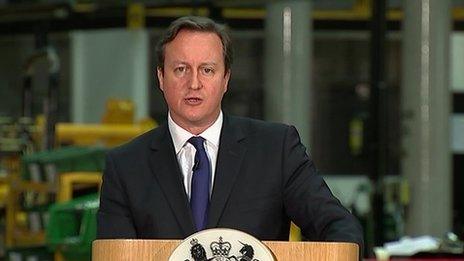UKIP's Nigel Farage wants return to immigration 'normality'
- Published
Nigel Farage said 27,000 people would have passed his points system in 2014 - but that exceptions would have been made to grant visas to nurses
UKIP would cut the numbers allowed into the UK to work but would not set an annual target, Nigel Farage said.
The party wants immigration to return to "normal" levels, said Mr Farage, with between 20,000 and 50,000 migrants given work permits.
A UKIP spokesman said last week work-related immigration, external should be capped at 50,000 a year.
Mr Farage insisted the party had not done a U-turn, but said the public were sick of talk about caps and targets.
Some 271,000 people moved to the UK to work in the year to September 2014, according to latest figures.
'Zero control'
Mr Farage said that under the Australian-style points-based visa system he wants to see, 27,000 people would have qualified to come to work in the UK last year.
"I can't see us getting anywhere near 50,000 but - I will say this - there has been an obsession with caps, floors, ceilings, targets all through British politics. I don't think the public are interested or believe any of it."
Ed Miliband reminds David Cameron of a "no ifs, no buts" contract in 2010 to reduce net migration to the UK.
Since 2000, he argued, "we have gone mad, we opened the doors to much of the world but in particular we opened up the doors to 10 former communist countries, and as a result of our EU membership we have absolutely zero control over the numbers who come".
Mr Farage told BBC News: "UKIP is putting forward a policy that will take immigration in Britain back to normal. Normal was from 1950 until the year 2000."
Last week, UKIP immigration spokesman Steven Woolfe said: "We would seek to have a cap of 50,000 on those coming here for work, for a period of five years."
'Making it up'
But Mr Farage said that had now changed.
"There's no U-turn, there's a change of emphasis. Rather than talking about caps we are talking about policy," he told BBC News.
Under UKIP, migrant workers would have to have a job paying more than £27,000 a year before being admitted - but there would be exceptions such as nurses.

UKIP immigration policy: How it would work
Set up an independent Migration Control Commission, which would set the number and type of highly skilled migrants to be admitted to the UK through an Australian-style points system
EU citizens would be treated the same as workers from the rest of the globe and would have to apply for the highly skilled migrant visa
Unskilled migrants to be banned from entering the UK for an initial five year period, subject to regular reviews by government
Foreign students and asylum seekers would not be included in the restrictions
But asylum seekers without identification papers would be returned to the country they came from
Upon qualifying under the points-based system, highly skilled workers would be issued with a visa valid for up to 5 years
They would not be allowed to claim benefits for the five year period
But once they have completed it they would be able to apply for permanent leave to remain, provided they haven't broken the law
EU citizens already living in the UK would not be deported and would have "indefinite leave to remain"
Reinstate the "primary purpose rule" - abolished by Labour in 1997 - for bringing foreign spouses and children to the UK. Foreign nationals married to British citizens would have to prove to immigration officers that the primary purpose of their marriage was not to obtain British residency

The party would set up a quango to decide on pay levels and who should be admitted.
Chancellor George Osborne accused Mr Farage of "making it up as he goes along".
The Conservatives have also said they want to get migration back to the levels seen in the 1980s and 1990s - but unlike UKIP their chosen measure includes students and family members, as well as those emigrating from the UK.
The total figure for net migration - the difference between the numbers settling in the UK for at least a year and those leaving for at least a year - was 298,000 in the year to September.
'Solemn promise'
That was three times what the Conservatives said they wanted it to be at this stage - but the party insists it has not abandoned its target of reducing net migration to the "tens of thousands".
Labour leader Ed Miliband clashed with David Cameron over his immigration pledge at Prime Minister's Questions in the Commons.
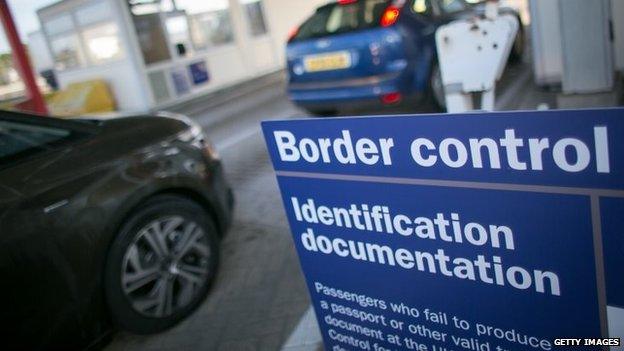
"Your promise on immigration makes the deputy prime minister's promise on tuition fees look like the model of integrity," said Mr Miliband to the PM.
"If you can break so spectacularly a solemn promise on a fundamentally important issue, why on earth should anyone believe any of your election promises this time?"
Mr Cameron read out a series of promises he said the Conservatives had kept in government, including on pensions, heath spending and benefits for pensioners, and attacked Labour's plans, before coming under further pressure from the Labour leader over his alleged broken promise.
The Tory leader said: "I have been very clear, we have cut migration from outside the EU. We have seen it rise inside the EU, we have a plan to deal with that."
In his speech, Mr Farage, whose party wants the UK to quit the European Union, promised to reduce "low-skilled, Eastern European migration" and say UKIP would treat EU and non-EU migrants in the same way, with qualifying workers issued with a visa valid for five years.
The party also says it would recruit an extra 2,500 border staff.
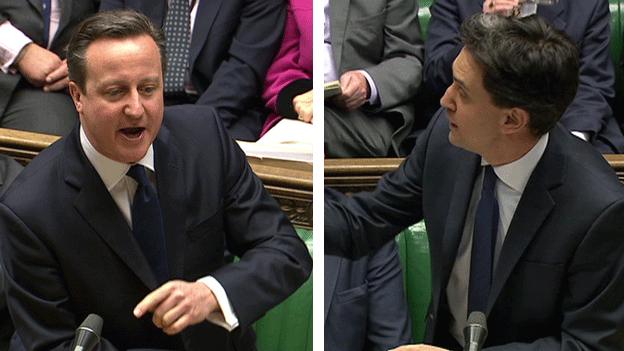
"Despite Mr Cameron's pledge, net migration is now up to 300,000 people per year. It is unsustainable, unfair and unethical," said Mr Farage.
In a question and answer session afterwards, Mr Farage said he was concerned about UKIP coming across as prejudiced.
"I don't want this party to be perceived as anything other than an open, inclusive political party, which without doubt it is," he said.
Asked whether immigration could reach the point where he was uncomfortable living in Britain, Mr Farage said: "I want to live in a country that is at ease with itself, where we speak the same language ... where our kids can play football with each other, and we all get on."
UKIP said opinion polls consistently showed immigration to be among the public's top concerns.
Mr Cameron has said he would put the issue at the heart of negotiations over Britain's relationship with the EU ahead of an in/out referendum.
He plans a crackdown on migrants' rights to welfare payments in order to reduce the "incentive" to come to the UK.
Labour has promised to "control immigration fairly", including plans to stop cheap foreign workers replacing British staff.
It would also recruit an extra 1,000 border staff, while the Lib Dems would reintroduce exit checks at borders.
Shadow Home Secretary Yvette Cooper said: "The Tories and UKIP have got themselves in a ridiculous tangle on their immigration promises.
"The Tories' net migration target is in tatters and they are arguing over whether to keep it. Now it seems UKIP are just as chaotic and confused."
- Published4 March 2015
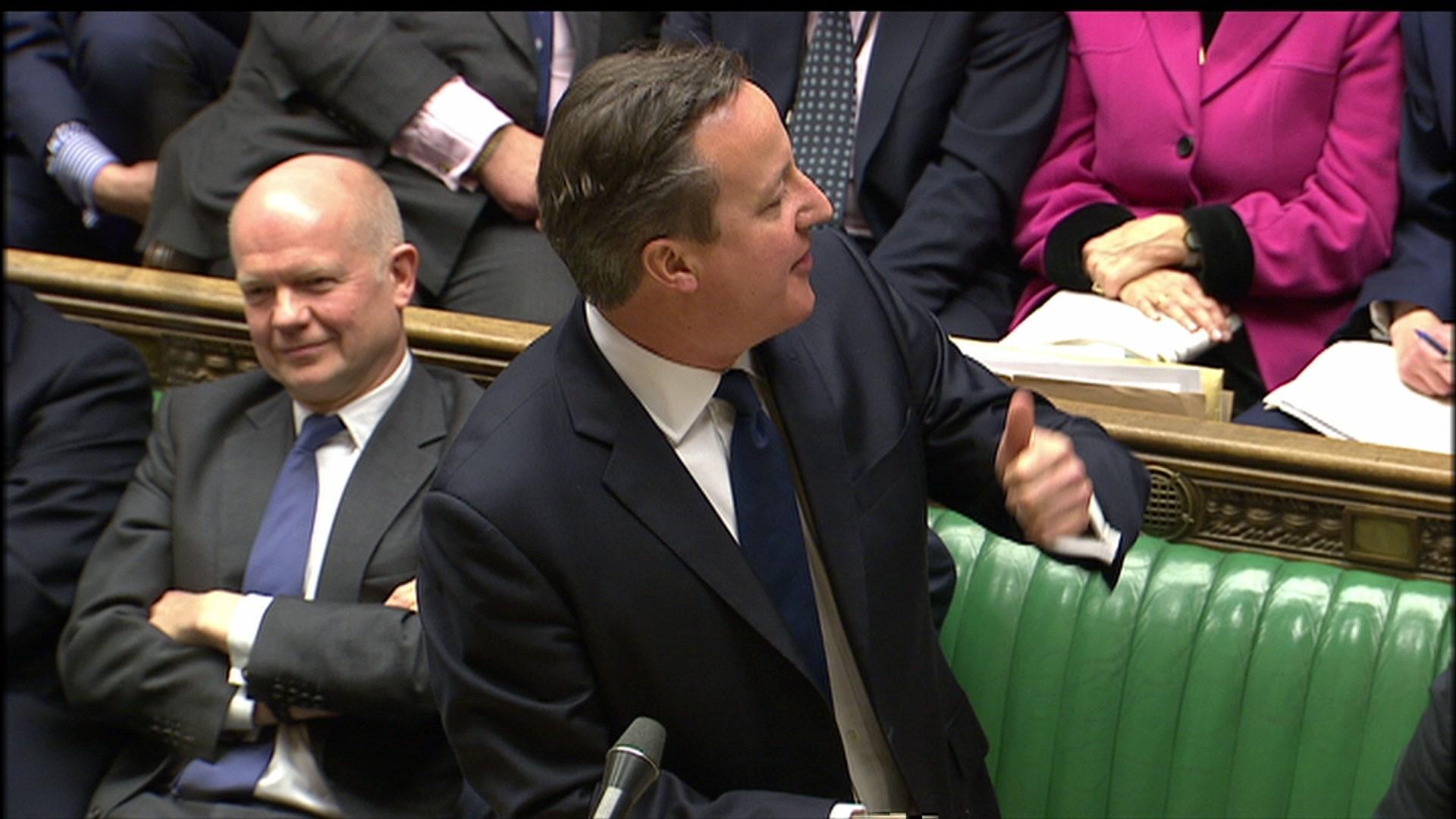
- Published25 February 2015
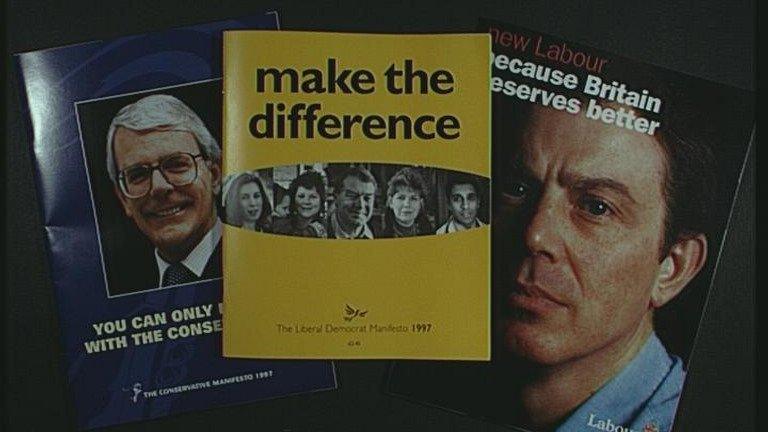
- Published26 September 2014
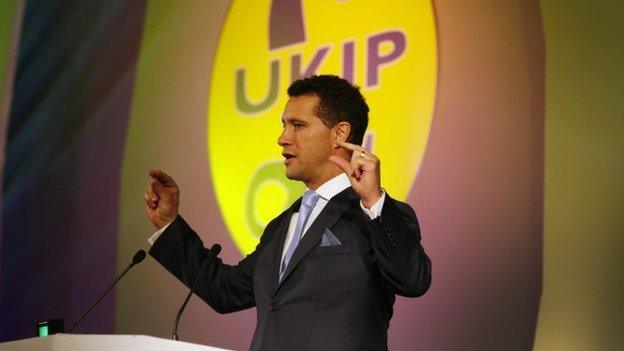
- Published15 December 2014
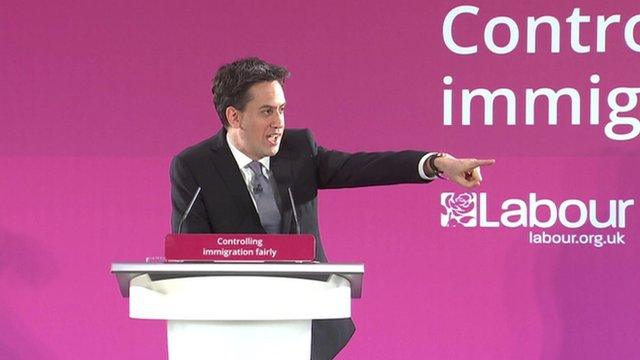
- Published26 February 2015
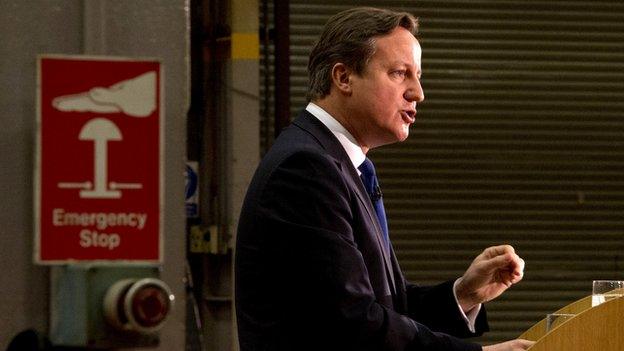
- Published28 November 2014
